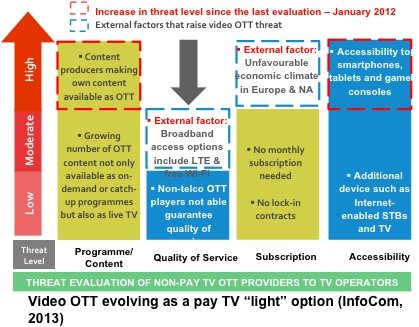As a matter of facts, in the mid-term, video OTT could erode a share of pay TV* operators’ revenues. Subscribers may choose to keep a basic TV subscription while they take advan-tage of video OTT players, such as Netflix, for premium content. This subscriber’s behaviour would result into declining ARPU but the effect in terms of subscriber erosion is and will remain rather limited. This is the reason why pay-TV providers’ strategies currently focus mainly on ex-panding revenue generating units and fight churn more than subduing video OTT impact.
Instead, own video OTT offers could be used to penetrate terrestrial TV households and local rivals’ base. In the UK, for instance, BT is using its video OTT offer to reach non-BT subscribers thereby transforming them into an additional revenue source. Video OTT offers from pay TV operators are normally much cheaper (but choice of channels is limited) than what OTT pro-viders normally offer as a basic TV subscription. And the price factor should pique some inter-est from terrestrial TV households that are otherwise not willing to spend money on full TV sub-scriptions. Thus, own video OTT is an opportunity for pay TV operators to infiltrate rival opera-tors’ base – providing a possibility for cross-selling other services.
Cannibalism has been raised as a potential repercussion on pay TV operators offering their own video OTT. We think that this issue will be alleviated by strategically choosing the content that will be made available via OTT, thereby creating a clear differentiation between full sub-scription TV and video OTT. BT, for instance, focuses its own video OTT efforts on premium packages such as sports. A few months after the OTT sports package has been launched, it was able to attract more than 500 000 households.
* Pay TV operators refer to companies that own their own infrastructure to provide subscription-based TV services such as CaTV, IPTV and satellite TV providers
About this extract: This extract in based on an Innovation Spotlight. InfoCom Innovations Spotlights topic-focused reports on the impact of new technologies and new market changes in the telecoms, IT and media industries and contain all InfoCom’s unique expertise as of monitoring and evaluating innovations for these industries. With 12 issues a year, you are best informed about compelling themes, which could impact your industry. If you are interested in this publication, do not hesitate to get in contact with us. Talk to us. We listen.


